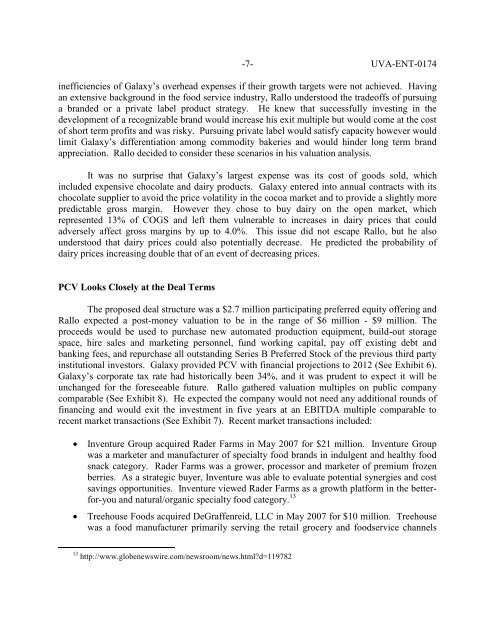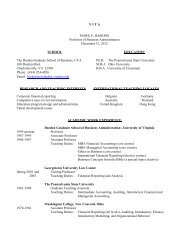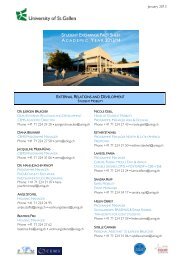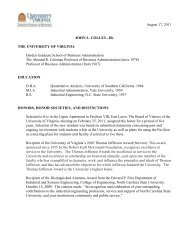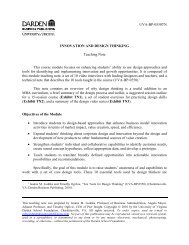Pacific Community Ventures & Galaxy Desserts: Community ...
Pacific Community Ventures & Galaxy Desserts: Community ...
Pacific Community Ventures & Galaxy Desserts: Community ...
You also want an ePaper? Increase the reach of your titles
YUMPU automatically turns print PDFs into web optimized ePapers that Google loves.
-7- UVA-ENT-0174<br />
inefficiencies of <strong>Galaxy</strong>‟s overhead expenses if their growth targets were not achieved. Having<br />
an extensive background in the food service industry, Rallo understood the tradeoffs of pursuing<br />
a branded or a private label product strategy. He knew that successfully investing in the<br />
development of a recognizable brand would increase his exit multiple but would come at the cost<br />
of short term profits and was risky. Pursuing private label would satisfy capacity however would<br />
limit <strong>Galaxy</strong>‟s differentiation among commodity bakeries and would hinder long term brand<br />
appreciation. Rallo decided to consider these scenarios in his valuation analysis.<br />
It was no surprise that <strong>Galaxy</strong>‟s largest expense was its cost of goods sold, which<br />
included expensive chocolate and dairy products. <strong>Galaxy</strong> entered into annual contracts with its<br />
chocolate supplier to avoid the price volatility in the cocoa market and to provide a slightly more<br />
predictable gross margin. However they chose to buy dairy on the open market, which<br />
represented 13% of COGS and left them vulnerable to increases in dairy prices that could<br />
adversely affect gross margins by up to 4.0%. This issue did not escape Rallo, but he also<br />
understood that dairy prices could also potentially decrease. He predicted the probability of<br />
dairy prices increasing double that of an event of decreasing prices.<br />
PCV Looks Closely at the Deal Terms<br />
The proposed deal structure was a $2.7 million participating preferred equity offering and<br />
Rallo expected a post-money valuation to be in the range of $6 million - $9 million. The<br />
proceeds would be used to purchase new automated production equipment, build-out storage<br />
space, hire sales and marketing personnel, fund working capital, pay off existing debt and<br />
banking fees, and repurchase all outstanding Series B Preferred Stock of the previous third party<br />
institutional investors. <strong>Galaxy</strong> provided PCV with financial projections to 2012 (See Exhibit 6).<br />
<strong>Galaxy</strong>‟s corporate tax rate had historically been 34%, and it was prudent to expect it will be<br />
unchanged for the foreseeable future. Rallo gathered valuation multiples on public company<br />
comparable (See Exhibit 8). He expected the company would not need any additional rounds of<br />
financing and would exit the investment in five years at an EBITDA multiple comparable to<br />
recent market transactions (See Exhibit 7). Recent market transactions included:<br />
� Inventure Group acquired Rader Farms in May 2007 for $21 million. Inventure Group<br />
was a marketer and manufacturer of specialty food brands in indulgent and healthy food<br />
snack category. Rader Farms was a grower, processor and marketer of premium frozen<br />
berries. As a strategic buyer, Inventure was able to evaluate potential synergies and cost<br />
savings opportunities. Inventure viewed Rader Farms as a growth platform in the betterfor-you<br />
and natural/organic specialty food category. 13<br />
� Treehouse Foods acquired DeGraffenreid, LLC in May 2007 for $10 million. Treehouse<br />
was a food manufacturer primarily serving the retail grocery and foodservice channels<br />
13 http://www.globenewswire.com/newsroom/news.html?d=119782


